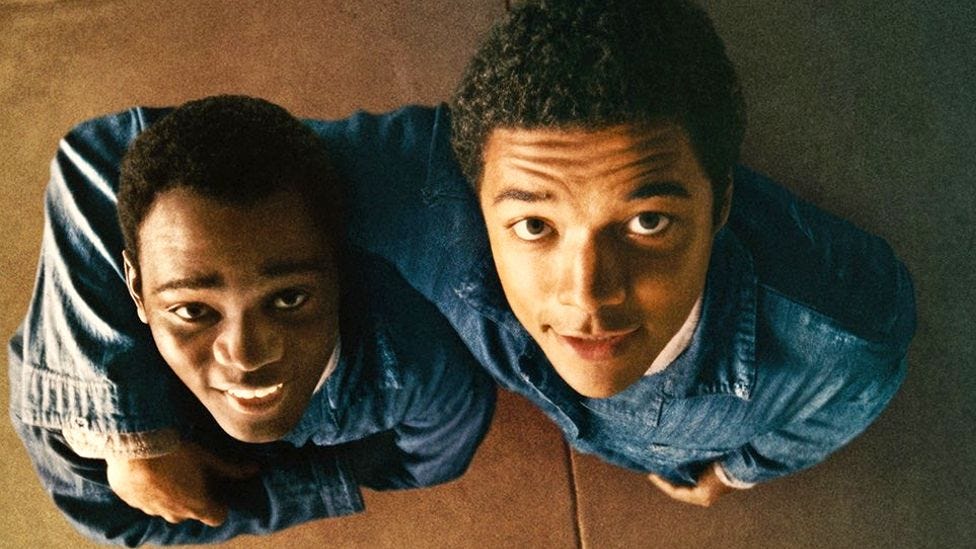Nickel Boys
An incredibly powerful based-on-true story of Black teens relegated to a Florida reformation school in the 1960s is tragically undermined by a rookie director's "look at me" style.
“Nickel Boys” has great source material for a movie. Adapted from a Pulitzer Prize-winning book by Colson Whitehead, it’s based on the true events of prison work camps for boys in Florida that operated for decades under a web of abuse and racism. It’s loosely based on the Dozier School, where they eventually found mass graves where dozens of mostly Black and brown boys, written off as runaways, were killed and buried.
It’s also got some terrific production values, especially the cinematography by Jomo Fray, which has a sort of washed-out beauty, and the musical score by Alex Somers and Scott Alario. The young lead actors, Ethan Herisse and Brandon Wilson, bring solid performances and Aunjanue Ellis-Taylor, an Oscar nominee for “King Richard,” is terrific as a grandmother.
And yet, “Nickel Boys” just didn’t work for me. I put the responsibility squarely on the shoulders of rookie director RaMell Ross, who also co-wrote the screenplay with Joslyn Barnes.
This is one of the most egregious examples of a director ruining a film with an unnecessary, distracting “look at me” aesthetic. He seems incapable of just letting the story play out on its own, the cast leading us through the story, supported by that outstanding camera work and music. The movie feels like a frisky puppy, so full of energy it just can’t sit still.
The movie keeps cutting away, cutting away — often to stuff that seems to have little to do with the story. Some of it is contemporaneous things from the era where it’s set, the 1960s, such as the space race, with rockets launching into the sky and stuff. I suppose the idea is to situate the horrible abuse happening to these kids, the advances of technology and the civil rights movement happening parallel with this medieval treatment of human beings.
Some of the other cutaways are just head-scratching, like what appears to be modern scans of brains, hearts and other body parts. Good luck if you can figure out what Ross was going for, because I sure can’t.
The movie is centered on Elwood (Herisse) and Turner (Wilson), two boys about 16 or 17 who are flung together at Nickel Academy after getting into scrapes with the law. In Elwood’s case, he was actually an honor student who just happened to be in the wrong place at the wrong time.
Both labor to keep their heads down at the Nickel. If Elwood is hopeful that things will eventually change, Turner is more cynical and convinced they just have to adapt to horrible circumstances.
Ostensibly, boys can work their way out of Nickel for good behavior, but in truth it never happens. The white dudes running the place profit from renting out their cheap labor, “Shawshank” style, so until they turn 18 they’re essentially prisoners.
The framing story is Elwood, now an adult played by Daveed Diggs, remembering and chronicling his experiences somewhere in the 2000s (which is around the time much of the real-life abuse was revealed). There either needed to be a lot more of these scenes, or cut them out entirely; as it is they don’t carry much emotional weight.
Ellis-Taylor is Hattie, Elwood’s grandmother, who refuses to let him just rot there and scrapes together money to hire a lawyer to pursue his case. She gets screwed over by whitey, too, but doesn’t give up, and their eventually abbreviated reunion is the film’s emotional high point.
Hamish Linklater plays the school administrator, who talks a good game about fairness but clearly sees the Black boys as just a step or two above slaves. Fred Hechinger is Harper, a red-headed kid about the same age as Turner and Elwood who works at the academy and cuts them a little slack, while making sure they know their place.
“Nickel Boys” is getting a lot of praise, showing up on critics’ best-of lists and a ton of awards nominations, including a BAFTA from the Brits and a best picture nod from both Critics Choice and the Golden Globes. It even got a Directors Guild nomination for first-time feature; they must know a lot more about directing than I do.
I’m open to non-conventional kinds of storytelling, but Ross at times seems to be trying to out-Malick Terrence Malick, who’s pretty much the king of this approach to filmmaking — trying to “contextualize” the main story. To me, this usually means employing a bunch of cutaways and camera tricks for their own sake, rather than advancing the story.
The human story of “Nickel Boys” is an incredibly powerful one — so much that it didn’t need a lot of adornment or unnecessary flourish. Sometimes a well-intentioned filmmaker can get in the way of their own movie.






I couldn’t agree with you more. I just saw this movie in a theater. I was so distracted by the direction that I was pulled from the story and couldn’t even pay attention to parts of it. I had to log on to the Wikipedia page to read the plot to get back on track more than once, simply because my mind kept straying. The POV camera work added nothing. Rather, it almost had the effect of removing the central character from the movie. A pure shame, considering the inherent strength of the source material. This was a movie I wanted to like but simple couldn’t.
ngl came to hate but i actually agree with your points. i guess for me it doesn't detract from the story enough but I see what you're saying